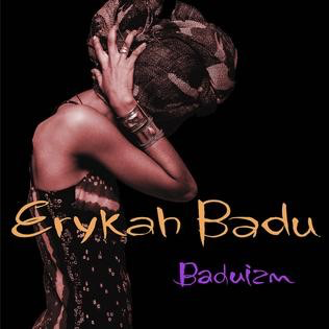“Baduizm”
(5/5 *****)
In honor of Black History Month, I will be reviewing multiple influential albums by Black artists. “Baduizm,” the neo-soul debut of luminary Erykah Badu, was released on Feb. 11, 1997.
Badu’s career is one of versatility and of beauty, and the beginnings of this genius blossom on “Baduizm.” While, further along her career, she undoubtedly focuses her sound — the turn-of-century introspection of “Mama’s Gun,” or the experimental funk of “Worldwide Underground” — her debut album showcases the breadth of her artistry across 14 tracks.
Of course, Badu declares this prowess in her iconic hushed, understated voice. Catchy croons and riveting riffs pepper each of these tracks. The smooth keys, bass and drums of the record provide a vibrant backdrop where her icy vocals captivate.
Perhaps the most popular of such is “On & On,” one of her biggest hits to this day. It jams slowly, with a looping piano sample and iconic backing vocals. You can’t help but nod your head or tap your foot when it comes on. Those first kicks from the drum hypnotize you instantaneously.
Badu’s lyrics also are equally poetic and comedic: “You rush into destruction ‘cause you don’t have nothing left / The mothership can’t save you so your ass is gon’ get left.” She’s also vigilantly aware of her humor, humming a small laugh at the end of the track.
Another hit off “Baduizm” is “Next Lifetime,” a sprawling six-minute anthem about loving someone else while in a relationship. Badu doesn’t know where to place her heart: “Now what am I supposed to do / when I want you in my world? / How can I want you for myself when I’m already someone’s girl?” This refrain comes in multiple times during the song, a constant grounding against the lustful verses.
I especially love the thumping bass line against the syncopated chromatic shifts that bookend the chorus. Badu’s sense of song is keen and sharp: she’s able to essentially repeat the same idea for three minutes while keeping it fresh, interesting and just as sultry as the track’s first notes.

“Baduizm” boasts a vibrant consistency unparalleled by many similar projects. The deeper cuts on this album shine with just as much luster. Take my personal favorite, “Appletree,” for example. Badu casually does a two-octave vocal jump, all while keeping her signature cool. With one of the catchiest choruses on the whole album and some of the most summer-y production, this song is Badu at her best.
Lyrically, she again plays and criticizes, touching on spirituality: “If you don’t wanna be down with me / you don’t want to pick from my apple tree.” It’s a timeless sentiment of self-love, tuning into your own intuition, and, frankly, being selfish and having fun with it.
The shorter cuts on this album pack a punch. On “Rimshot,” the intro and outro of “Baduizm,” Badu “diggy-diggies” against jazzy drums and upright bass. It reads as an improvised cut played at soundcheck, before the ***real*** show starts, yet provides and summarizes the experience this record gives you: fun and catchy, yet introspective neo-soul.
Badu’s candor on “Afro (Freestyle Skit)” is simultaneously comedic and enjoyable to listen to. She tells a story of her getting her hair done for a Wu-Tang concert, but her date bailed out on her last-minute. Even her spoken voice is iconic. A horn solos over these vocals, with a bare instrumental of just a keyboard and some snaps.
The horns continue on “Other Side of the Game,” another one of my favorites. It details an interesting relationship, with illegal activities underscoring their love. However, Badu feels the need to stand by her partner to raise their child, remarking how capitalism undoubtedly fails lower-class individuals. It’s another honest and jazzy cut with great instrumental lines and a standout vocal performance.
Badu continues to stun across the remainder of the track list. “Certainly” texturally is interesting: the constantly undulating upright bass keeps the track propelling under tight and consistent melodies. The backing vocals continue to infect the listener’s ears, in another instance of R&B bliss.
On the sun-soaked “4-Leaf Clover,” Badu again plays with spirituality and luck, looking back on her troubles and forward to her love. It’s an incredibly fun track, with another serving of her greatness and consistency as an artist.
The cultural impact this record had is immeasurable. By Badu being unabashedly herself, drawing from her soul to create an unmistakable sound, many R&B artists going into the 2000s did the same. Amy Winehouse comes to mind, as well as the modern R&B titans SZA and Frank Ocean. These artists similarly captured their personality in their music beautifully, thanks to artists like Badu.
